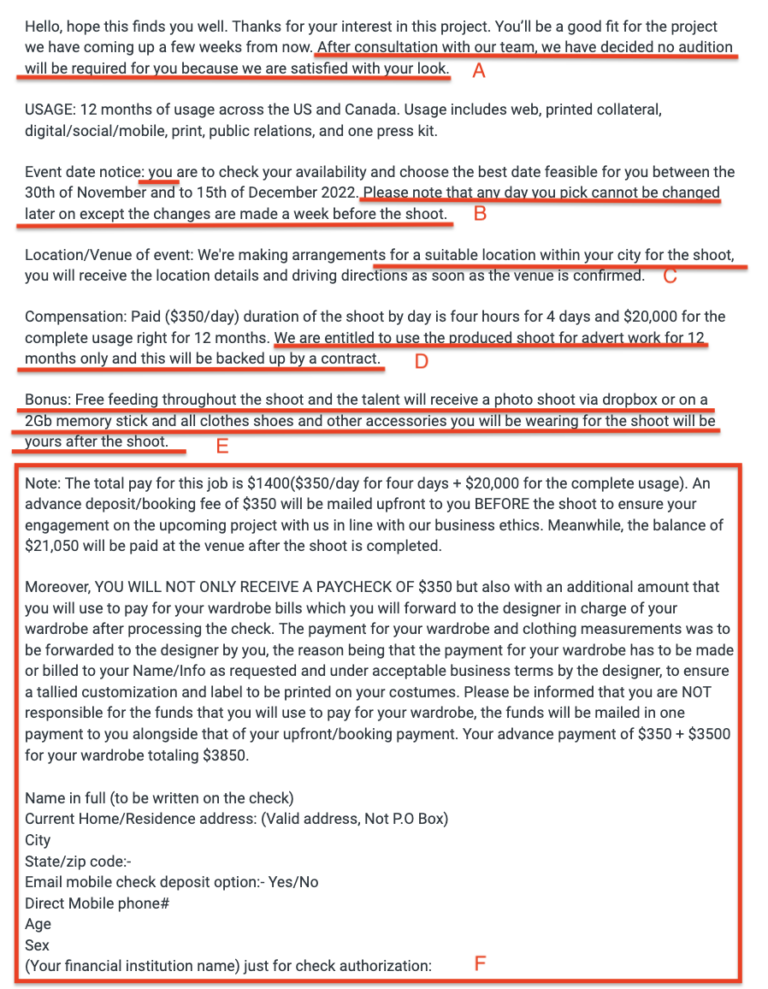Protecting Yourself From Money Scams
With the WGA Writers’ Strike putting a halt on work, and a potential SAG-AFTRA Strike on the way, we expect to see more money scams targeting actors and others whose livelihoods depend on the entertainment industry. When there is an opportunity to capitalize on fear, anxiety and desperation, you can bet that there is someone out there plotting how they can take advantage of the situation.
Casting Networks manually and meticulously reviews and approves projects that get submitted, and our team works hard to sniff out scams before they are posted. However, you can never be too careful, and we recommend keeping an eye out for red flags, even here.
What are money scams?
Money scams are exactly that. Someone, or sometimes, a team of people is trying to cause financial harm to you and others using deceptive tactics. Sometimes they are obvious, such as a mysterious email from a Nigerian prince that promises to share his fortune with you, a complete stranger, for a small bank transfer of $500; but other times they are very crafty.
As we get more accustomed to their practices, scammers pivot to even more sophisticated ways to digitally separate you from your money. That said, when you’re stressed, you’re not always thinking as clearly as you normally would, and a crafty scammer could easily separate you from your wallet if you’re not prepared. And not every website will have a thorough review process for them.
What are the most common red flags for money scams?
There are many different types of money scams that work and exist all over the internet. The good news is they all have very similar tells, and there are several ways to help you spot them. Here are some money scam examples to help you identify a scammer so that you can avoid being taken advantage of:
Requests for money: This applies to absolutely any situation under the sun. If they are asking you for money to be involved in a project, report them to us at reportabuse@castingnetworks.com and their project will be removed.
Accepting payment before starting the project: Scammers want to give you a check to cash before you’ve even done the job. Often, they will instruct you to deposit the check into your account, then give them a few hundred dollars back in the context of paying for an aspect of production, such as costumes, makeup, craft services, etc. DO NOT DO THIS. This is a form of check fraud known as “check kiting.”
Too much information is provided: Scammers tend to provide too much information. They will tell you in detail about the project, the full details of where this project will be shown, about their company and everything they do, how much the pay is with too much explanation, etc. (e.g. “Hi thanks for photo, we will be coming to your city, where are you?”)
Misspelled words and bad grammar: If an email has misspellings, odd phrasing, bad English and incorrect use of words, it might be a scam.
Wanting to hire you without an audition: Some real projects will cast talent from a photo submission, but a scammer will always be ready to book you for a job without any prior contact.
Wire transfers: Scammers will often come up with a variety of excuses for why you need to wire them money. They’ll even offer to pay you extra in exchange for wiring some money back to them. Unknown to you, the money you wire will be picked up by the scammers’ associates using a different name, likely in a different country, and then they’ll disappear. Never wire any stranger money, ever.
No casting notices: If someone you’ve never heard of before emails or texts you out of the blue offering to cast you in a project, ask them what site their project was posted on and what it was called. If they don’t have a casting notice that they can link back to for more details, then you should be suspicious! On Casting Networks, casting directors cannot see your email address. So the first time they contact you, their message will be sent through our system. This means you will receive an alert in your account, along with an email with the same message showing Casting Networks’ information.
To keep your eyes sharp, we’ll explain why each item is a red flag.
A – No audition is required.
B – Bad grammar and too much information given.
C – Bringing the work to your city.
D – Bad grammar and too much information.
E – Bad grammar and too much information.
F – A little bit of everything, but this is the crux of the scam. Here is where they mention that you will be paid BEFORE the work starts, ask for an advance payment and request your personal and banking information.
How can I report a money scam if I find one on Casting Networks?
If you have any questions about a project you see on our site or a questionable communication you’ve received from someone related to a project on our site, please email reportabuse@castingnetworks.com and we’ll look into it with you.
Let’s recap the most common red flags for scams:
- Requests for money
- Accepting payment before starting the project
- Misspelled words and bad grammar
- Wanting to hire you without an audition
- Wire transfers
- No casting notices
Now that you know how to spot and avoid money scams, you can go after the right projects with confidence and peace of mind. Sign up or log in to Casting Networks to start auditioning for your next acting role today!
Learn more:
- Protecting Yourself as an Actor
- Frequently Asked Questions About the Writers’ Strike
- 3 Things Actors Should Do Now to Financially Survive the Writers’ Strike





